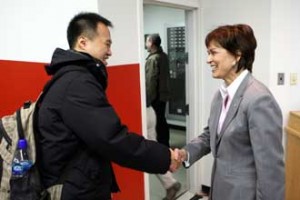
Shuttle bus, travel guidelines also prompt questions to the Principal
By Neale McDevitt
In many ways, the Nov. 12 Town Hall at Macdonald Campus was for Principal Heather Munroe-Blum something like performing a high wire act without a net. For one of the first times since the advent of these open meetings, there were no themes set beforehand, no formal framework shaping the proceedings. It was Town Hall unscripted. The Principal unplugged.
“I don’t come here pretending to have the answer to every question,” Munroe-Blum acknowledged from the outset and that spirit of frankness was carried throughout the 90-minute session.
Prof. David Bird kicked off the proceedings by asking the Principal how the deteriorating state of the global economy would affect McGill. Munroe-Blum replied that the gradual drying up of governmental funding over the last 20 years has taught McGillians “how to do more with less.”
The key, she said, is for McGill to continue its strategy of diversifying its sources of revenue as much as possible, noting records since 1920 show that regardless of the economic situation of the day, the rate of philanthropy directed toward the university has never flagged. “We have to approach this as an opportunity to expand the base of people to give to our cause,” she said.
Munroe-Blum continued by saying her chief concern is that the downturn would prompt the provincial government to pull back on investing in universities and university research. But she also said tough economic times often precipitate a spike in student enrolment as new grads who had been thinking of joining the workforce for a few years before beginning graduate studies often decide it might be more prudent to stay in school.
When pressed about the possibility of layoffs among non-academic staff, the Principal was clear. “We have no plans to make differential cuts by virtue of the constituency,” she said. “No matter what we have to do and even if we’re compelled to cut back on the overall budget… across-the-board cuts are not in the works.”
Money was also an issue when Munroe-Blum was asked to discuss such issues as tuition and graduate funding. “We’d like to have the capacity to re-regulate undergraduate tuition in a reasonable way that is consistent with our commitment to investment – 30 cents on every new dollar of tuition to go toward student aid,” she said.
“We have a totally different approach at the graduate level,” she said. “We’re doing every we can to get full support for our graduate students and we’ve had success at the federal level. I think Quebec could take a further step in that regard, but we’ll continue to push.”
The shuttle bus to the downtown campus proved to be the day’s most popular topic, with a pair of students asking if the much-used service could be expanded during peak hours. Although she sympathized with the crowded conditions aboard the shuttle during rush hour, the Principal said the University’s emphasis on recruitment and infrastructure makes it impossible to expand the shuttle fleet. “Having people to teach and having a place to teach them takes precedent over the shuttle bus,” she said. “We simply cannot take it out of the operating budget.”
Munroe-Blum suggested instead that people discuss the possibility of a levy in support of another bus with their respective student associations.
Nicholas Smith, a third year Science student and a reporter with the McGill Daily, turned the focus away from economics when he asked the Principal about McGill’s procedures for passing matters of policy – specifically the travel guidelines that were vigorously debated at a recent session of Senate.
Munroe-Blum said the University has no institutionally derived travel policy at the moment and that current guidelines are set by specific faculties and programs. However, following an incident in which students were scheduled to travel to a region that was listed as on High Alert by the Department of Foreign Affairs, the University stepped in.
“If you go to a region that is on High Alert, there is no government support at all if anything should go wrong,” she said.
Morton Mendelson, Deputy Provost for Student Life and Learning is leading a consultation process through which a set of University-wide travel guidelines will be drafted. While these guidelines will be discussed in Senate early in the New Year, Munroe-Blum made it clear this is not an issue to be approved by Senate. “At the end of the day risk, safety and liability matters is for the judgment of the administration,” she said. “Once we develop the policy, it will be approved by the Board of Governors.”
To view a webcast of the Town Hall, visit http://media.campus.mcgill.ca/misc/MacTownhall08b.wmv
